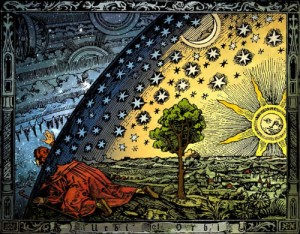Why is there something rather than nothing?
Why is there something rather than nothing ? Or to put it another way why do we and for that matter the Universe exist ?
These kinds of questions along with their proposed answers form a ‘set’ of philosophical conundrums known as The Cosmological arguments.
The Cosmological Arguement
| Question : | Why is there something rather than nothing? |
| Answer : | God |
Such are the beginning and end of the cosmological argument, and there isn’t a great deal in between: one of the classic arguments for the existence of God, and at once one of the most influential arguments in the history of philosophy.
They are all empirically grounded, based (in the most familiar version) on the seemingly unobjectionable observation that everything that exists is caused by something else. This something else is, in turn, caused by something else again, and so on and on and on. To avoid going back forever in an infinite regress, we must reach a cause which is not itself caused by something else: the first and uncaused (or self-caused) cause of everything, and this is God.
Roots in Antiquity
Like many of the other classic arguments for Gods existence, the cosmological argument has its roots in antiquity, and it is the basis for the first three of one of the most famous philosophers in history, Thomas Aquinas’ Quinque Viae (or Five Ways), a set of five arguments for the existence of God. A modern cosmologist answering the question ‘Why does anything exist?’ would doubtless refer you to the big bang, the cataclysmic explosion 13 or so billion years ago that gave birth to the universe – to energy and matter and even to time itself. But this does not help much – it merely obliges us to rephrase the question: what (or who) caused the big bang?
The Argument in More Detail
 The plausible-looking premise on which the cosmological argument is based – that everything is caused by something else – is based on our experience of how things are in the world. The argument also depends on the notion that an infinite regression of causes is intolerable: the chain must end somewhere, and that somewhere is logically God, who is therefore uncaused (or self-caused). To achieve this God must lie outside the scope of ‘everything’, which must means something like ‘outside all things in nature’. In other words, God must be supernatural.
The plausible-looking premise on which the cosmological argument is based – that everything is caused by something else – is based on our experience of how things are in the world. The argument also depends on the notion that an infinite regression of causes is intolerable: the chain must end somewhere, and that somewhere is logically God, who is therefore uncaused (or self-caused). To achieve this God must lie outside the scope of ‘everything’, which must means something like ‘outside all things in nature’. In other words, God must be supernatural.
However even if we allow that the chain of causes has to end somewhere, why can’t the something that is uncaused or self-caused simply be the universe itself? If the idea of self-causation is accepted, God would become redundant.
However such a conclusion sits uncomfortably when you start to consider other things about the cosmos and the human experience, such as what is human consciousness or self, what about the Anthropic Principle : the observation that the existence in this universe depends on numerous cosmological constants and parameters whose numerical values must fall within a very narrow range of values. If even a single variable were off, even slightly, we would not exist.
Whatever you think you will have to agree this is one debate that is set to run and run indeded it’s already been going on for thousands of years already. I know what I believe but you’ll have to decide for yourselves what you believe or ‘know’.
Thomas Aquinas (1225-1274)
 St Thomas Aquinas was a Catholic Priest in the Dominican Order and one of the most important Medieval philosophers and theologians. Even today the study of his works forms a core of the required program of study for those seeking ordination as priests or deacons.
St Thomas Aquinas was a Catholic Priest in the Dominican Order and one of the most important Medieval philosophers and theologians. Even today the study of his works forms a core of the required program of study for those seeking ordination as priests or deacons.
The works for which he is best-known are the Summa theologiae and the Summa Contra Gentiles.
Thomas’s “Five Ways” (Quinque Viae from the Summa Theologiae) or five proofs for the existence of God :
1. The Argument from Motion : Thomas argues that since everything that moves is moved by another, there must thereby exist an Unmoved Mover.
2. The Argument from Efficient Cause : The sequence of causes which make up this universe must have a First Cause.
3. The Argument to Necessary Being : Since all existent things depend upon other things for their existence, there must exist at least one thing that is not dependent and so is a Necessary Being.
4. The Argument from Gradation : Since all existent things can be compared to such qualities as degrees of goodness, there must exist something that is an Absolutely Good Being.
5. The Argument from Design : Also named “The Teleological Argument” — The intricate design and order of existent things and natural processes imply that a Great Designer exists.







You must be logged in to post a comment.